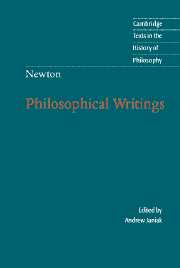Book contents
- Frontmatter
- Contents
- Acknowledgments
- Introduction
- Chronology
- Further reading
- Note on texts and translations
- I Correspondence with Robert Boyle [1679]
- II De Gravitatione [probably before 1685]
- III The Principia [1687, first edition]
- IV Correspondence with Richard Bentley [1692–3]
- V Correspondence with Leibniz [1693 and 1712]
- VI Correspondence with Roger Cotes [1713]
- VII An Account of the Book Entitled Commercium Epistolicum [1715]
- VIII Queries to the Opticks [1721]
- Index
- CAMBRIDGE TEXTS IN THE HISTORY OF PHILOSOPHY
Introduction
Published online by Cambridge University Press: 05 June 2012
- Frontmatter
- Contents
- Acknowledgments
- Introduction
- Chronology
- Further reading
- Note on texts and translations
- I Correspondence with Robert Boyle [1679]
- II De Gravitatione [probably before 1685]
- III The Principia [1687, first edition]
- IV Correspondence with Richard Bentley [1692–3]
- V Correspondence with Leibniz [1693 and 1712]
- VI Correspondence with Roger Cotes [1713]
- VII An Account of the Book Entitled Commercium Epistolicum [1715]
- VIII Queries to the Opticks [1721]
- Index
- CAMBRIDGE TEXTS IN THE HISTORY OF PHILOSOPHY
Summary
Natural Philosophy consists in discovering the frame and operations of Nature, and reducing them, as far as may be, to general Rules or Laws – establishing these rules by observations and experiments, and thence deducing the causes and effects of things.
– Isaac NewtonNewton as natural philosopher
Newton's scientific influence permeates our culture. Forces are measured in newtons, we have “Newton's rings” and Newtonian fluids, we apply Newtonian mechanics in a remarkably wide range of cases, and the law of universal gravitation characterizes what is still considered to be a fundamental force. Indeed, the very idea that a force can be “fundamental,” irreducible to any other force or phenomenon in nature, is largely due to Newton, and still has currency in the twenty-first century. Because of these achievements, Newton is regularly mentioned in the same breath with Copernicus and Galileo as a founder of modern science. Although Newton is rarely listed along with figures like Descartes or Spinoza as a founder of modern philosophy, and although he never wrote a treatise of the order of the Meditations or the Ethics, his influence on philosophy in the early modern period was nevertheless profound. Indeed, Newton was one of the great practitioners of what the early moderns called “natural philosophy.”
Fully understanding Newton means avoiding anachronistically substituting our conception of philosophy in the twenty-first century for what the early moderns understood by “natural philosophy.”
- Type
- Chapter
- Information
- Isaac Newton: Philosophical Writings , pp. ix - xxxiPublisher: Cambridge University PressPrint publication year: 2004
- 2
- Cited by



